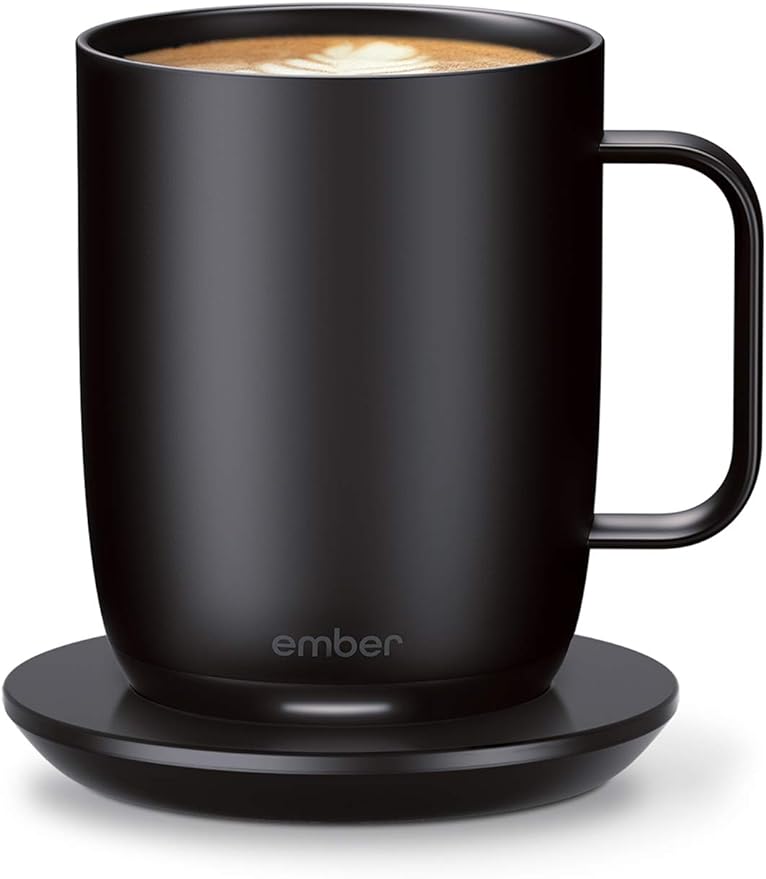| We may receive compensation from partners & advertiser links at no cost to you. Read our disclosure for details. |
The amazing health benefits of coffee in the morning don’t stop there! Scientific studies highlight caffeine’s powers in enhancing brain function, promoting heightened focus, and boosting alertness.
Beyond being a beloved pick-me-up, coffee boasts a myriad of health benefits specifically tailored to enhance the well-being of those in their prime years.
I didn’t really enjoy coffee until after college. By then, I had some important conversations with my doctor about getting older, family health history and the facts of life.
It turns out, there were many health benefits of coffee in the morning — especially for us older adults, which helped me to appreciate it even more in my 50s!
I went from drip coffee to French press, then Aeropress and back to drip. I made it a morning ritual 7 days a week. Two cups of coffee in the morning and a cup in the afternoon just to get to the finish line.
Getting older doesn’t mean giving up the things you enjoy. There are many science-backed health benefits of coffee.
This post is aimed at bringing light to just a few health considerations for any age, especially if you’re entering your 40s or 50s. Welcome to the club!
Note: This is not intended to be medical advice, but it is supported by research. Be sure to consult with your doctor if you have questions.
What Are the Benefits Of Coffee In The Morning?
When people talk about coffee, the first thing that pops up is caffeine!
Some people can’t function without their morning jolt. For others, too much caffeine is dangerous.
But did you know coffee has antioxidants and other natural substances that can help reduce inflammation and shield you from various diseases?
Just ask the nutrition experts from Johns Hopkins University School of Medicine.
Across the board, studies suggest a moderate coffee habit opens the door to an array of health benefits. Beyond its role as a morning pick-me-up, a cup (or two) of coffee can do more than just warm your spirits.
It can boost your mood, heighten awareness, and potentially shield you against certain diseases. Research underscores the benefits of coffee extend as your age advances. Woohoo!
In particular, for those of us in our 40s & 50s, the magic of coffee unfolds even more profoundly. A look at the data reveals a striking correlation: daily coffee is linked to a lower risk of mortality.
Coffee’s Holistic Health Benefits
Coffee is more than just a drink — it’s a source of holistic benefits for individuals of all ages.
- Antioxidant Richness: Coffee emerges as a potent source of antioxidants, playing a pivotal role in safeguarding the body against free radicals. This inherent richness offers a defense against the development of chronic diseases, notably heart disease and type 2 diabetes.
- Brain Boost: Beyond physical well-being, moderate coffee consumption intertwines with cognitive health. Studies highlight a decreased risk of Alzheimer’s and Parkinson’s disease, showcasing coffee’s potential to fortify brain health and enhance mental alertness.
In essence, beyond the daily routine of your daily brew, coffee becomes a conduit to a plethora of health benefits.
From fortifying the body against internal adversaries to nurturing cognitive vitality, each sip carries the promise of well-being, making that cup of coffee more than just a comforting indulgence — it’s a gateway to a healthier and happier life!

Thank you! Ember Temperature Control Smart Mug ($100-$120) >>
Pros of Your Morning Cup of Coffee
In the morning, coffee can serve as an effective kickstart to the day. The caffeine content in coffee acts as a natural stimulant, helping to improve alertness, concentration, and mood.
For me it gets my creative juices flowing!
Morning consumption can enhance cognitive function and promote a sense of wakefulness, making it an ideal companion for individuals looking to jumpstart their productivity levels.
Additionally, the ritual of enjoying a cup of coffee in the morning can also have psychological benefits, creating a positive and comforting routine that sets a positive tone for the day.
There’s a Catch
While that morning coffee is a ritual for many it can be an issue to some individuals sensitive to caffeine or those mindful of blood sugar levels.
- Caffeine Sensitivity: For some, heightened sensitivity to caffeine can lead to jitteriness, increased heart rate, or even disrupted sleep patterns. Tailoring the amount of coffee consumed can help mitigate these effects.
- Blood Sugar Impact: Coffee can influence blood sugar levels, particularly in individuals with diabetes or insulin resistance. It’s important to be mindful of added sugars in coffee and their potential impact on blood sugar regulation.
- Stomach Sensitivity: Coffee’s acidity may pose challenges for individuals with sensitive stomachs. Opting for lower-acid coffee varieties or having a small snack alongside coffee can help alleviate potential discomfort.
- Dependency Concerns: Regular morning coffee consumption can lead to dependency, with individuals experiencing withdrawal symptoms if they miss their daily cup. Moderation and occasional breaks can mitigate this concern.
As with any dietary habit, balance and moderation are key to reaping the benefits of morning coffee without compromising well-being. Be sure to consult with your healthcare provider.
What About an Afternoon Delight?
In the afternoon, coffee can offer a different set of advantages. As the day progresses and energy levels may dip, a moderate amount of coffee can provide a gentle pick-me-up without disrupting sleep patterns.
The afternoon slump is a common phenomenon, and a well-timed cup of coffee can help combat fatigue, improve focus, and sustain energy levels.
Moreover, the antioxidants present in coffee have been linked to various health benefits, such as reducing inflammation and supporting cardiovascular health, which can be advantageous regardless of the time of day.
On the other hand, while a moderate amount of coffee can combat that post-lunch energy dip, you should be aware of potential disruptions to sleep quality if consumed too late in the day.
Caffeine has an average half-life of about 5 hours, meaning its stimulating effects can linger for a long time, potentially interfering with the ability to fall asleep.
Additionally, excessive caffeine may lead to negative side effects. Keep scrolling.
More Health Benefits of Coffee in the Morning
As we age, coffee seems to become an even more potent ally. AARP suggests that for adults in their 40s, 50s, and above, regular coffee consumption can boost brain health, help lower the risk of type 2 diabetes, and even improve your mood!
Additionally, coffee’s protective effects extend to mitigating risks associated with aging-related conditions, such as heart issues and neurodegenerative diseases.
- Live Longer: Coffee enthusiasts in their 40’s and 50’s may experience a lower risk of mortality from major health concerns like coronary heart disease, stroke, diabetes, and kidney disease.
- Control Sugar: Regular coffee intake is associated with improved sugar metabolism, reducing the likelihood of developing type 2 diabetes.
- Heart Health: Consuming one to two cups of coffee daily proves beneficial in preventing heart failure, particularly important for maintaining optimal blood circulation as the heart ages.
- Parkinson’s Disease: Coffee, with its caffeine content, is linked to a reduced risk of developing Parkinson’s disease and may contribute to better motor control for those already managing the condition.
- Liver Health: Whether opting for regular or decaf, coffee provides protective effects for the liver, promoting the maintenance of healthy enzyme levels — an essential consideration for older adults.
- Your DNA: Dark roast coffee has been shown to diminish DNA strand breakage, potentially serving as a protective measure against cancer and tumors, particularly relevant for adults in the 40-50 age group.
- Colorectal Cancer: Coffee drinkers, be it regular or decaf, exhibit a 26 percent lower likelihood of developing colorectal cancer — a notable benefit for adults in their 40s, 50s and above seeking to reduce their cancer risk.
Note: These health benefits are based on various studies and research findings, and individual responses to coffee may vary, especially for older adults. Always consult with a healthcare professional for personalized advice.
RELATED
Keep it Simple With Coffee in the Morning
In the world of coffee, keeping things simple to get the full health benefits of coffee in the morning is the secret. Like many things in life, moderation is key.
Most health experts, like those from Cleveland Clinic, agree that no more than 3-4 cups of coffee daily should be fine for most healthy adults.
However, everyone’s tolerance to caffeine is different, and some may need to limit their consumption.
Also, it’s important to pay attention to what you’re putting in your coffee. Loading it up with sugar and cream can turn a healthy drink into a high-calorie timebomb, that can contribute to weight gain and other health issues.

VitaCup specializes in making beverages tasy and healthy too >>
Opting for black coffee, without sugar and cream, ensures a pure and unadulterated experience. This straightforward approach not only preserves the beverage’s health benefits but also keeps caloric intake in check.
The Potential Downsides of Coffee in the Morning
Despite the numerous benefits, drinking coffee can also have potential downsides, particularly if consumed in excessive amounts.
High caffeine intake can lead to insomnia, restlessness, heart palpitations, and even osteoporosis over time.
People in their 50s may also be more sensitive to caffeine. It can increase blood pressure, an important consideration for anyone with hypertension.

Additionally, drinking coffee can stimulate the release of stomach acid, which could lead to heartburn or other gastrointestinal issues. This happened to me.
So my routine is a low-acid coffee from VitaCup or Lucy Jo’s in the morning and a half-caff or decaf in the afternoon.


Women who are pregnant, trying to become pregnant or breastfeeding need to be cautious about caffeine. And high intake of boiled, unfiltered coffee has been associated with a mild increase in cholesterol levels.
Things to keep in mind regarding caffeine:
- Insomnia and Restlessness: Excessive caffeine intake can lead to insomnia, restlessness, and heart palpitations.
- Bone Health Concerns: Over time, high caffeine intake may contribute to osteoporosis.
- Blood Pressure Sensitivity: Individuals in their 50s, especially those with hypertension, should be cautious of the potential blood pressure elevation caused by caffeine.
- Gastrointestinal Issues: Coffee’s stimulation of stomach acid can lead to heartburn and other gastrointestinal problems.
Consult with Your Doctor
At any age, especially in your 40s & 50s, consulting with a healthcare provider to confirm all the health benefits of coffee should be your first step.
Individual health considerations can influence the appropriate amount of coffee intake or if it’s even a good idea.
Additionally, paying attention to what goes into your coffee is essential. Excessive sugar and cream can turn a healthy drink into a hostile enemy to your body.
In This Post:
- Aeropress Original Coffee Press ($40)
- Ember Temperature Control Smart Mug
- Lucy Jo’s Mellow Belly Low-Acid Coffee ($15)
- VitaCup Coffee & Tea Beverages
Information is meant to be accurate and educational and not intended to be legal, medical or financial advice. Be sure to do your own research and contact a professional for help. Our site is free to use, but we may receive a commission from our partners & advertisers at no additional cost to you. Read our disclosure for more information.
Licensed insurance broker helping individuals, families and small business owners get affordable benefits.